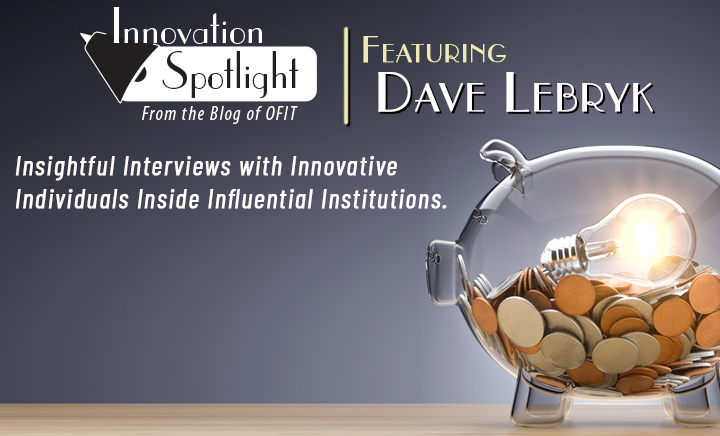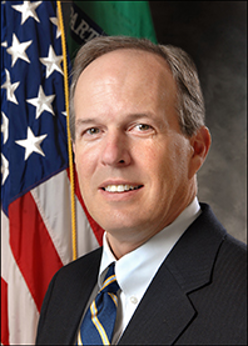

Innovation Spotlight: Interview with Dave Lebryk, Fiscal Assistant Secretary, U.S. Department of the Treasury

Welcome to the Spotlight Innovation Series: a series of blog posts highlighting the perspectives of innovative leaders across the federal government to the financial management community. Each month, we sit down with an innovative leader, pick their brain on their transformative experiences, and share those insights with our blog readers.
David A. Lebryk, Fiscal Assistant Secretary, U.S. Department of the Treasury
 Dave Lebryk was appointed Fiscal Assistant Secretary in 2014 and has since been responsible for overseeing the operations of the federal government’s financial infrastructure, including payments, collections, debt financing, accounting, and shared services
Dave Lebryk was appointed Fiscal Assistant Secretary in 2014 and has since been responsible for overseeing the operations of the federal government’s financial infrastructure, including payments, collections, debt financing, accounting, and shared services
Before his appointment as Fiscal Assistant Secretary, Mr. Lebryk served as Commissioner of the newly formed Bureau of the Fiscal Service. He has also spent time as the Deputy Commissioner and Financial Management Services Commissioner, Deputy Director at the U.S. Mint, Deputy Assistant Secretary for Fiscal Operations and Policy, Acting Deputy Assistant Secretary for Human Resources for the Treasury Department, and as an Advisor to the Deputy Secretary of the Treasury and to three Undersecretaries for Domestic Finance. Mr. Lebryk joined the Treasury Department as a Presidential Management Intern in the Office of the Assistant Secretary for Policy Management and Counselor to the Secretary. Mr. Lebryk graduated with an A.B. in Economics from Harvard University and a Master of Public Administration from Harvard University’s John F. Kennedy School of Government.
What is innovation?
We started the interview by asking Dave for his definition of innovation – which he described as the application of an idea and the resulting improvement. Dave went on to stress that innovation can be individual-driven: 'You as an individual, in your workspace, can be an innovator. You can have an innovative idea, and by working to implement that idea, can bring innovation and improvements into your day-to-day work. It doesn't have to be something that's earthshattering, it can just be any idea that significantly improves the workplace or the services we provide.'
Dave also defined innovation as an essential means to 'remaining relevant'. Although the government is stable in ways that companies might not be, Dave said that part of remaining relevant was understanding your customers and using that understanding to deliver a better customer experience, and that innovation was critical to that work. 'It's about your ongoing success. If you're not embracing innovation in your organization, your organization will atrophy, and will become less relevant. You remain relevant by giving services to your customers that they want, need, and like.'
Values that Drive Innovation
With a definition in mind, we transitioned to talking about what successful innovation looks like, and how it can be driven by individuals. Throughout the conversation, Dave came back to a few key values. First was an appetite to learn: 'To be successful at innovation, you have to be a learner. You have to be constantly looking for ways to improve your work processes, how you can learn more about the general environment around you. Not just in your own area, but more generally, what’s going on in the world at large.'
Dave's second value was collaboration: 'You also have to be collaborative, because innovation doesn't take place in isolation. The wisdom of crowds is true – I never walk into a room and think I'm the smartest person in the room. I know that the collective knowledge and experience in the room is much deeper than my own. If you have collaboration and a collaborative environment, it brings out that knowledge and will lead to innovation.'
Dave concluded with a third value -- a commitment to excellence --- which brings everything together at an organizational level. "You [need to] have a commitment to excellence. If I'm committed to excellence, then I am going to be collaborative, I am going to be a learner, I am going to be interested in innovation, because for my organization to be excellent --- to remain relevant -- it has to be committed to that kind of thinking, and to those qualities."
Innovation and Risk
Although the values Dave highlighted are tenets of the Bureau of the Fiscal Service, there are challenges to implementing and sustaining a culture of innovation. Dave pointed out that routine and mission critical processes serve large numbers of people, don't allow much room for error, and are difficult to take risks with – yet risk is a part of innovation. But he also offered a solution that would help advance innovation without jeopardizing core operations – rotations or details that provide employees an opportunity to learn new ways of doing things and to bring new perspectives to established processes. 'If you do your job, and you do it well, you gain some level of expertise and mastery over your area. That is generally good, yet it can lead to a narrowing of perspective, and you can start to settle in and look at that the business processes the same way all the time. It's good to challenge yourself and to say, "maybe I don't know everything" and to go into a new situation which requires learning new perspectives and ways of doing things. At the same time, you're bringing some level of mastery and experience to a new position, and the new organization might not have looked at the business or a problem in the same way. I think an organization can encourage innovation and can break down silos by saying "it's important for people to rotate throughout the organization, to learn, and to bring their skills, and to look at things differently."
Dave also discussed how different levels of risk can be applied to various processes in an organization, citing the Bureau's Risk Appetite Statement. As an example, the Bureau has a Low-Risk Appetite for daily operations and protecting privacy, but a High-Risk Appetite for implementing initiatives that facilitate innovation and growth in financial management, specifically referring to introducing and testing pilots with emerging technologies. It's a tricky balance, Dave says, needing to continue the operational excellence needed for mission critical processes and exploring emerging technologies – but both are important for the longevity of any organization.
Examples of Successful Innovation
We talked at length about the pandemic, and how it forced change and increased organizations' willingness to take risks. But there were other innovations that have come about recently that Dave cited as important examples of innovation with good prospects. The Quality Service Management Offices (QSMO) initiative, for example, was a new and different way of thinking about shared services with a customer-centric focus and applying bots to improve service delivery in the Administrative Resource Center (ARC). Dave also pointed to new ways of thinking in how we approached payment-related activity, like the issuance of three rounds of Economic Impact Payments in record time (data matching to issue more payments electronically and the use of Debit Cards), Direct Express (mobile apps), and Payment Integrity processes (fraud detection) and said "taking information that we have in the Bureau and applying that information to future or new payments so they can get to people faster, more safely, and less expensively was a great example of innovation done right".
New and Emerging Technologies
We asked Dave about the new and emerging technologies on the horizon that he was most interested in. Besides developments in cybersecurity, Dave pointed to cloud computing, as it provides 'better access to data, lower costs, and a reduced carbon footprint.' Machine learning was another topic of interest: "I think that machine learning has a lot of potential, whether that be in the fraud detection and prevention area or in reducing improper payments area which could be really useful to us in a 2–5-year timeframe."
Advice for readers
As we came to the end of our conversation, we wanted to see what advice Dave wanted to offer our readers, and anyone interested in innovation. Echoing his earlier sentiments on learning, Dave said "You have to be a learner. You must look not only in your organization but understand what's going on in the organizations outside your own. Pay attention to what's going on beyond your specific area and take advantage of training and educational opportunities. Also, it is important that everyone in the organization knows that they can make a difference."
We would like to thank Dave once again for his time and willingness to participate in the FIT Innovation Spotlight Series. His emphasis on the core values of learning, collaboration, and a commitment to excellence provide a valuable lesson to all readers.
